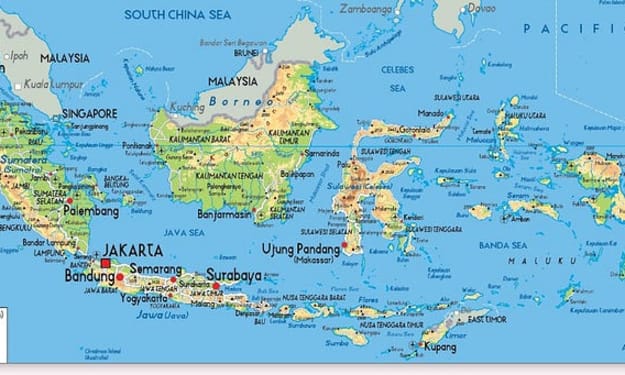Julia Roberts to rewrite Eat, Pray, Love
Shedding new light

Can a book, film, media, warp public perception of a culture that it can be blamed for ruining it?
Elizabeth Gilbert’s book Eat, Pray, Love, (2006) and subsequent film starring Julia Roberts (2010).
The book and movie raise many questions.
In overview, the story which was sold as a memoir but in reality, is meta-fiction is about a self-centered, One Woman's Search for Everything across Italy, India, and Bali.
The story chronicles the author's trip around the world after her divorce and what she discovered during her travels.
What she discovers is hedonism, fake gurus, navel meditation, disingenuous lovers, and a flagrant disregard for fact. The reader is unaware that her publisher gave her a $200,000 advance to go on this global hotel hop.
Gilbert’s darling husband ended in divorce but the after-effects of what she wrote about life in Bali resonates to this day.
Gilbert who is too afraid to return to Bali didn’t deter Roberts from coming back.
This time, she's here to pen a sequel that mirrors a new reality: "Eat, Pay, Leave." The once idyllic spiritual scene of Ubud, she observes, has evolved into a bustling marketplace of spiritual entrepreneurship.
"It's a different vibe now," muses Roberts. "Everyone's either teaching or being taught, in this endless loop of life coaching. It's like Ubud's become a matryoshka doll of mentors."
Her new book, inspired by her latest visit, delves into the commercialization of spirituality. “Eat, Pay, Leave" is Roberts' witty take on how monetization has seeped into Ubud's once pure spiritual pursuits.
Commenting further on the after-effects of Gilbert’s marketing guide for lonely and gullible women she said.
"I came back seeking tranquility, only to find 'META-performative spirituality,'" Roberts quips. "It seems enlightenment now comes with a price tag and a business plan."
I investigated the famed Holy Man, Ketut Lyer in Gilbert’s story to learn that Balinese traditional healers don’t do palm readings. He learned the craft to earn a living during the WWII Japanese occupation. In addition, Balinese tourist drivers added his name as a must-do experience. They got a kickback on every $50 palm reading.
Furthermore, I stayed next door to where the landlord swears Gilbert wrote the book and gave me a list of names that she wrote about and where I might find them.
The list led me to a few bars and warungs (restaurants) where I found several happy ex-pats to share what they knew about Gilbert’s story and characters. For starters, the man who swept her off her feet into marriage and vaginal issues was a womanizer that called all his affairs “darlings.”
From there the story crumbled into a question was any part of it true?
Ubud's transformation hasn't gone unnoticed by locals and long-time visitors alike. "It used to be 'find yourself.' Now, it's more 'fund yourself,'" comments a local café owner, serving organic coffee to a backdrop of digital nomads and budding life coaches.
Roberts' proposed sequel is set to explore this new spiritual landscape, where every second person is a coach, coaching coaches to coach more coaches. "It's a coach-ception," she laughs. "You can't swing a yoga mat without hitting a life coach."
"Eat, Pay, Leave" promises to be a tongue-in-cheek commentary on the commercialization of the spiritual journey. "Ubud's still beautiful and more crowded, but now you might get charged for that sunset meditation," Roberts adds with a knowing smile.
As Ubud continues to morph into a hotbed of spiritual commerce, Julia Roberts' return and her new book stand as a mirror to the changing face of this Balinese paradise.
My take is Bali has succumbed to bad planning and regulation, which has led to pollution, overcrowding, horrible traffic, chaos, crime, and frustration.
Another word for it would be “greed.”
According to Investments.com Bali has earned the #1 place for most ruined by tourism.
Parts of the island are better than the others but Ubud has seen its better days.
There are prostitutes, penis trinkets, rowdy bars, drunk tourists, and a lot of hustle. But to be fair, mixed in with the bad there are nice shops. restaurants, festivals, and people of all races trying to earn a living and get along with each other.
The image of Bali being a paradise remains tattooed in the minds of unknowing foreigners. My friends think I’ve hit the big time for just being there!
Every year a new wave of ex-pat dreamers splashes ashore and many float away on a life raft. The turnover is dizzying and makes it hard to know or care who anyone is.
Once you get out of the city you might find a spot where you feel like the only person on the planet.
Many of the locals are wonderful. If you open your mind to it there’s a lot to learn like Gamelan music, Balinese art, dance, temples, and Hinduism.
Perhaps Roberts’ new book will shed new light on the story.
About the Creator
Arlo Hennings
Author 2 non-fiction books, music publisher, expat, father, cultural ambassador, PhD, MFA (Creative Writing), B.A.






Comments
There are no comments for this story
Be the first to respond and start the conversation.